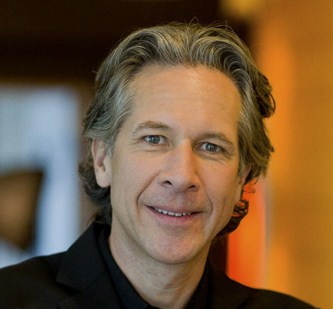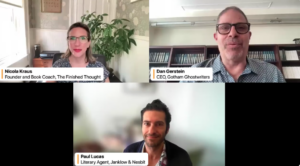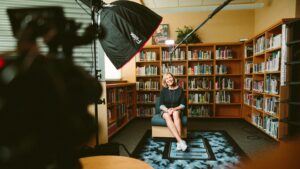
Kevin Maney is a writer and consultant. He selectively works with CEOs and companies on writing projects that give something interesting or important to the world. His most recent book is Unscaled: How AI and a New Generation of Upstarts Are Creating the Economy of the Future and prior to that, he wrote Play Bigger: How Pirates, Dreamers, and Innovators Create and Dominate Markets. Learn more at kevinmaney.com.
Tell us about your writing journey. When did you know you could make a career out of it, and what was that decision like?
By high school I knew I liked writing and could write well, and then went to Rutgers to major in journalism and English. Seems like I was always determined to make a career of it—didn’t really know what else I could do.
A big turning point came in my junior year at Rutgers. My journalism heroes were witty and topical columnists, especially Russell Baker and Mike Royko. I wanted to be them. I convinced the Rutgers Targum — the campus’ daily newspaper — to let me write a regular humor column, which was titled “Maney Yak.” Well, the column was a hit and I became known around campus as “Maneyak.” From that point on, I was driven to become a national columnist and a brand of my own. That finally came true in the 1990s at USA Today.
If you could go back and change anything about your writing career, is there anything you would choose to do differently?
I gave up too easily on writing fiction. Around 1991-92, I wrote a full-length novel. This was before I had the column at USA Today; before I’d published any books. I was an unknown. I wanted to write fiction. So I finished this book, “Red Bottom Line,” that leaned heavily on reporting I’d done for USA Today in Russia as the Soviet Union collapsed. I found an agent — Ben something-or-other — who turned out to be terrible. I’m not sure he did much of anything to sell the novel. As time went on, I got discouraged and just figured the novel must have sucked. I had one printout, which I stuck in a drawer, The digital version was on some long-defunct word processing software on a floppy disk.
Fast-forward to the present, nearly 30 years later. My daughter, Alison, who was born around the time I wrote the novel, wanted to read it. Earlier this year, when I was rummaging around a storage space, I found the printout. I figured I should read it before sending it to her in case it was wildly embarrassing. I expected the worst. But, you know — a lot of it was damn good. Alison, who is also a writer and magazine editor, thought so too, though she had some very constructive criticism. I don’t think anyone would’ve ever published the novel as it was, but a good agent and/or editor might have helped me turn it from a C- to a B+ and got it out there. Or at least given me the encouragement to learn from my mistakes and try again.
Do you have any quick tips for working with editors?
Yeah, one big one: Think of the editor as a reader. Too many editors want to make changes in your copy that aren’t very good. But instead of fighting the changes, realize that the editor probably wanted to make those changes because something wasn’t working well. So make your own (better) changes to fix what the editor felt was broken.
What’s next for you? … if you will, the next not-shiny object that you’ll be chasing?
I do such a variety of things these days. I’m almost always writing a book. At this moment, I’m between books—one comes out in June—and trying to decide on the next one. Several different high-profile potential collaborators have approached me with ideas. My goal is to choose one that I think will be truly meaningful. But we’ll see.
In the meantime, the 2016 book “Play Bigger,” which I co-authored with three Silicon Valley veterans, has turned into a sizable consulting business helping companies reframe who they are and what they mean to the world. That work is a lot like journalism. I ask a lot of questions, listen hard, and try to write the real story, which is often not the one the executives tell.
How do you balance your own projects with your ghostwriting projects?
It’s a giant juggling act. I think my work under my name gives me more credibility as a behind-the-scenes guy. I don’t do a lot of book ghostwriting—more ghosting for CEOs or other leaders who want help with something like an op-ed column. And I do some of what I call “book consulting”—which is what Gotham is now doing with its editorial services offerings. A CEO comes to me and says, “I want to write a book,” and I help him or her figure out what the book is and how to get it done.
What makes a successful ghostwriter?
Storytelling. It’s usually what “thinkers” stink at. They have their big concepts and points they want to make. They talk in PowerPoint. As a ghost, it’s your job to find, research and write the entertaining stories that illustrate those points.
How often do you take on ghostwriting projects? What have you learned from those experiences?
I usually have some ghost type of thing in the mix. What have I learned? Actually, that if you ghost for really interesting people, you learn a hell of a lot.
What is an “editorial strategist for big think books”?
As I eluded to before, it’s what I call “book consulting.” It’s basically helping a high-profile person shape a book idea, sketch it out, and build a plan for getting it done. Then you pull the escape hatch handle before having to write it.
How do you work with business leaders to get to the hook of their idea(s)?
I often tell collaborators that there are three aspects to a book idea. There’s what you want to write for whatever purpose you want to write it. Then there’s what you have permission to write because of who you are or what you’ve done. Then there is what an audience would want to read. Somewhere in the intersection of all three is a decent book concept.
How is working with business leaders different or similar to other people?
Ha. I don’t know! I’ve never worked with other people!
Your book “Play Bigger” was written by “a band” because of your three co-authors—how different was that to working with one other person? What tips can you share for other writers?
That was a tough one to figure out. What helped was we spent so much time together that our banter got ingrained in my head. When I wrote, I tried to capture the spirit of that banter as a singular voice throughout the book. It seemed to work remarkably well.
Ready to bring your vision to life? Tell us about your project below and we’ll match you with the right writer for the job.



